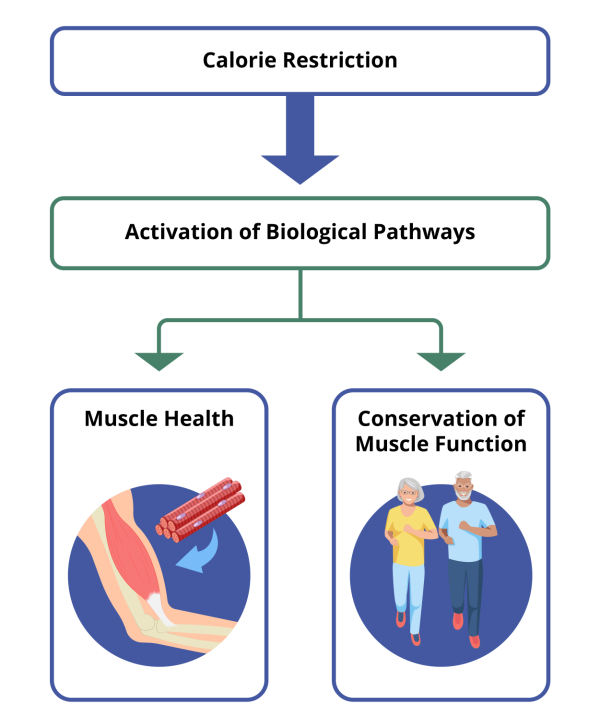Eat Less, Age Better
Modest Calorie Restriction May Benefit Human Health
BY STEPHEN ANDREWS, NCI
Sit down for a meal with an Okinawan elder and you might be told to mind your hara hachi bu, a Confucian-inspired Japanese concept to practice mindful eating and stop when you feel 80% full. With a reputation for longevity of life, the Okinawans might be on to something.
Beyond extending lifespan, reducing food intake might also improve health span—the length of time a person is relatively healthy.

CREDIT: NIA
Data from the multisite CALERIE study is being used by scientists to show how modest calorie restriction influences multiple biological pathways that can help us age better.
“Our research indicates that moderate calorie restriction in humans has the potential to influence various biological pathways [that], when activated, may positively contribute to healthy aging and resilience of muscle tissue,” said NIA’s Jayanta Kumar Das. Das is first author of a recently published paper (Aging Cell 12:e13963, 2023) that suggests calorie restriction (CR) can have positive, not negative, effects on sustaining skeletal muscle. This research builds on years of discovery.
Laying a foundation of clinical research
CR means reducing average daily caloric intake below what is typical or habitual, without malnutrition or deprivation of essential nutrients. Restricting energy intake seems to be having a moment in popular culture, too, with fads such as intermittent fasting en vogue.
But if energy affects almost all processes within an organism, from sleep to movement to aging, what could be happening physiologically for, in effect, eating less to be beneficial for longevity? Some of the first investigations into calorie restriction were conducted in mice and nonhuman primates. Those studies showed positive broad effects of CR on the longevity and long-term health of the animals.
Next came testing those findings in humans. In the early 2000s, Eric Ravussin at the Pennington Biomedical Research Center (Baton Rouge, Louisiana) assembled a meeting of the leading investigators on CR to initiate design of a clinical trial to test how calorie restriction over two years would affect several biological processes. Investigators in aging research including NIA’s Rafael de Cabo and Donald Ingram, and writers of the first textbook on CR Roy Walford and Rick Weindruch, all participated and supported the initiation of this multisite Comprehensive Assessment of the Long-term Effects of Reducing Intake of Energy (CALERIE) Study, which was supported with funds from NIA and NIDDK.

CREDIT: NIA
Rafael de Cabo
An ambitious goal was set for participants to restrict their typical caloric intake by 25%. In the end, they achieved a 12% reduction in calorie intake with support and monitoring from an interdisciplinary research team. But the results were still positive.
According to de Cabo, those participants that restricted calories by even a small margin of 12% had improved mental health, a healthier sleep core temperature, and lost trunk fat, compared with control subjects who continued regular calorie intake (J Gerontol A Biol Sci Med Sci 70:1097-1104, 2015).
Built to last
Rigorous study design was integral to ensure that the data could be used many years after the initial trial concluded. In 2010, 225 diverse individuals were recruited between 21 and 50 years of age for men and, for women, 21 and 47, which avoided the metabolic effects of menopause confounding results. The participants had to have a body-mass index between 22.0 and 28.0. They also were screened for other exclusion criteria that would confound results, such as engaging in frequent strenuous exercise.
Interdisciplinary involvement in retaining and coaching participants was crucial to the trial’s ongoing success over the past decade. As the findings came in, the researchers developed a public database biorepository of CALERIE study data so that other scientists in the field could answer their own questions. Through the CALERIE website, hosted by Duke University (Durham, North Carolina), investigators could learn about the initial study, access the biorepository, and apply for research funding. And this has brought forth new insights.
Aging stronger
After those promising initial findings, NIA Scientific Director Luigi Ferrucci became involved. Research conducted at the Pennington Biomedical Research Center had found that modest caloric restriction also lowered cardiometabolic risk and lowered weight along with muscle mass but did not lower muscle strength. Ferrucci found this intriguing considering that the participants were of healthy weight when the study began. “We thought to hunt for mechanisms behind this muscle strength phenomenon,” he said.
For that study, the researchers procured thigh muscle biopsies from CALERIE participants collected when individuals joined the study and at one-year and two-year follow ups. To figure out which genes CR was affecting, they recovered messenger RNA from the samples and ran a gene-expression analysis.
Small changes in the muscle gene-expression profile were uncovered using deep genomic sequencing, which included alternative splicing. This process occurs when rearrangements of the exons (coding sections of an RNA transcript) lead to changes in the final protein. The study authors, including de Cabo and Ferrucci, believe that this is where CR is mediating its effect in muscle tissue and may significantly affect muscle tone and function over the long term.
Effectively augmented by CR, the muscles were generating more force per unit of mass. The scientists found upregulated genes implicated in mitochondrial biosynthesis, which effects energy production, as well as DNA repair and antioxidant mechanisms, which fight inflammation. Muscle is one of the most metabolically active organs in the body, and as such, the cells accrue outsized damage and oxidative stress over time. The newly associated pathways through which CR works could potentially combat that damage and preserve the longevity and function of muscle cells as we age.

CREDIT: NIA
Luigi Ferrucci
“Since inflammation and aging are strongly coupled, calorie restriction represents a powerful approach to preventing the proinflammatory state that is developed by many older people,” said Ferrucci in an online article by Life Extension. Future studies are planned to validate the strength-conserving findings and determine whether it is indeed altered protein expression that is driving the physiological changes.
CR’s multitude of mechanisms
Other researchers have confirmed the benefits of CR tested in the CALERIE study and have shown broad effects across multiple organ systems. For example, Yale University (New Haven, Connecticut) researchers showed how CR induced anti-inflammatory and antiaging effects in fat and blood cells (Immunity 55:1609-1626, 2022).
Further analysis of CALERIE data at Mayo Clinic (Rochester, Minnesota) found phenotypic changes in the blood of participants undergoing CR that showed a decrease in cellular senescence, which is a process in which cells slow their growth. Other studies found preservation of the thymus In aging humans, the thymus, a producer of immune cells, declines in size and function.
Is it for everyone?
Decades of research show that obesity accelerates aging and that reducing caloric intake for individuals who are above average weight results in significant health benefits including a decreased risk of multiple comorbidities and chronic inflammation. The American Heart Association, American College of Cardiology, and the Obesity Society now recommend prescribing CR in addition to other interventions.
In the CALERIE study, however, researchers focused on individuals with healthy weights. So, does this research warrant the same recommendations for these healthy individuals?
“At this time, we don’t have enough evidence to put out a public statement—we can’t guarantee anything,” said Ferrucci, adding that even with the intriguing results in muscle and other tissues, it was clear that not every individual responds the same way to CR. This inconsistent response is partially due to metabolic adaptation, timing of meals, and other lifestyle and environmental factors that cannot be controlled.
Both de Cabo and Ferrucci emphasized that NIA will continue to collaborate with the CALERIE team and note that the database, which is available after submitting an online request form, is a fantastic resource for all researchers to help answer new questions. Longer and larger randomized controlled trials are needed to investigate the longer-term effects of sustained CR beyond two years. While the evidence mounts in favor of CR for better aging, specific clinical guidelines for all individuals are still on the horizon. “[We are going to] keep on doing the science we are doing, and keep showing that calorie restriction is preserving health,” said de Cabo.
To learn more about the CALERIE study, visit https://calerie.duke.edu.

Stephen Andrews is a postbaccalaureate research fellow at NCI who is studying molecular genetics and tumor modeling related to neuroendocrine tumors of the small intestine and pancreas. Outside of the laboratory, he enjoys running, cycling, cooking, and visiting art galleries.
This page was last updated on Saturday, November 23, 2024
